I watched a couple more, familiar flicks that make the list. Again, there are several criteria to make the list, but the main one is a strong, admirable male protagonist . . . someone about whom I don’t mind saying: “Son, if you grow up to be like so and so, I’m OK with that.”
For this entry, we have a couple of bona-fide father figures.
“A Man for All Seasons” (1966)
Features: Paul Scofield, Robert Shaw, Orson Welles, and Leo McKern. Directed by Fred Zinnemann.
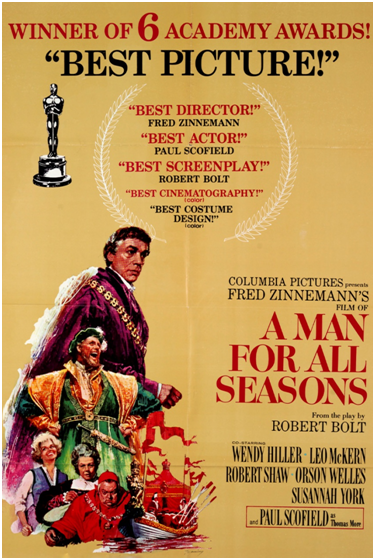
Snapshot:
A terrific portrayal of classic “unstoppable force meets immovable object.”
Plot:
In a historical drama, Sir Thomas More tries to steer a knife’s edge course between publicly supporting or opposing the famous/infamous Henry VIII of England.
Content:
Very clean.
-Those who already understand “the birds and the bees” will catch the references to the king’s aberrant proclivities, but innocent audience members will not be shown or told anything remotely inappropriate.
-The Duke of Norfolk is the least clean character, but even that is saying much. He uses the D-word a couple of times, and tries to punch More at one point.

Quality of Entertainment:
Mature audiences (13+) should be able to catch on to the movie’s drama, and find it quite engaging and compelling.
Tomatoes rates the movie a very high 89%, with an audience score of 87%. A couple example reviews:
Critic: “Audiences won’t remember the picture for its elaborate settings or spectacular scenes, but it would be difficult for them to forget the human qualities of its historical characters, who are made to practically live and breathe.” –Judy Todd, Salt Lake Tribune
Audience: Impeccable casting, provocative story line, great direction and editing, mesmerizing photography, gorgeous costumes all make for a perfect film. Have seen every 10 years since released and always find something new to appreciate and remember. Scofield and Shaw well-deserved their Oscars as does the Film.”
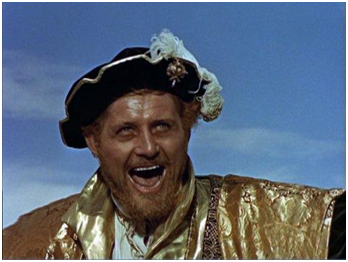
A Deeper Dive:
Caution: spoilers ahead.
There are . . . a TON of great stories that underlie the awesomeness of this movie, but let’s start with the obvious one: Robert Shaw as Henry VIII.
King Henry VIII of England is well recorded as having certain personality traits. Most especially, historians note the mid 1520s as when Henry suddenly began a transformation from a reasonable, pleasant and conservative man, to one who was intolerant, irritable, and tyrannical. This movie takes place during the later stages of this transformation, and Shaw’s portrayal of such a domineering personality is absolutely captivating.
For example, we’re introduced to Henry as he arrives by boat at More’s house. The king’s barge lands at a muddy beach, and with no alternative, the king leads the way and simply jumps out into the muck. He cruelly turns and stares at his courtiers, still in the boats. The royal entourage looks at him in apprehension, with absolutely silence. Satisfied that they won’t dare interpret the scene without him, the king finally decides to make it into a joke, bursting into laughter. Naturally, the entourage follows suit, with a similar, forced laughter. In only 15 seconds, without telling us about the king or even speaking words, Shaw and Fred Zinnemann (the director) have shown us what type of man Henry of the VIII is: a bombastic, insecure, wild-eyed tyrant, not above ruling through fear.
I won’t give away more than that, but consider this: Shaw filmed all of his scenes for the movie in a single day, appears in the movie for less than 4 minutes of screen time . . . and received an Oscar nomination for the performance.
Moving on, I was surprised when I re-watched this move to have two other excellent actors appear, almost first thing: Leo McKern, and Orson Wells.

Wells portrays Cardinal Wolsey, responsible for getting king Henry what he wants, and like Shaw, he barely appears in this movie. However, also like Shaw, his role is memorable, and important- here we have a guy dominant in power and appearance, appealing to another influential man, Sir Thomas More, to assist in the efforts to accommodate the king. More says no, and ultimately Wolsey fails, dying in ignominy, but not before giving More a final twist of the tail, naming him the new chancellor, responsible for assisting the king. Again, Zinnemann shows the story: a powerful man’s failure has led to his ruin . . . what will More’s fate be?
Next, Leo McKern as Thomas Cromwell is easy to miss, but absolutely fantastic.

I first started to recognize McKern’s genius a few weeks ago, when I began watching an old TV show about a British criminal defense lawyer: “Rumpole of the Bailey.” His deep voice, and ability to quickly shift from jocular to vicious is truly superb. He comes across as both cunning and determined . . . a man given more power and influence than he deserves, but don’t ever say that to his face.
What the director (Zinnemann) has effectively done is to load up an entire cast with dominant personalities . . . heavyweights accustomed to drawing all of the attention on the screen and imposing their will upon others. All that, for the purpose of contrasting them against the movie’s true star:
The Protagonist: Sir Thomas More, portrayed by Paul Schofield
Great story here: Schofield began his portrayal of More on stage, and despite his best efforts, received harsh criticism. Scofield later referred to the part as the only time “my intuition for the part has failed me,” forcing him to “start from scratch and just work on facts, making myself totally faithful to what was on the page”. After realizing “I had to find the way the man would feel; then I was able to find the way he should sound”, and the vital importance of conveying complete sincerity and humility when “playing a man of spiritual depth.”1

Schofield’s re-imagined portrayal of More transformed the play into a powerful emotional experience, one which Fred Zinnemann himself experienced. As a result, the on-screen interpretation of the play allows Schofield’s performance to be contrasted by the domineering, star power performances of McKern, Wells, and Shaw. Zinnemann, the same director as “High Noon” and “From Here to Eternity,” knew exactly what he was doing: Schofield’s More is quiet, humble, reasonable, and deeply spiritual. These qualities become so much more compelling when alongside characters of volume, bombast and disgrace.

It’s difficult to explain how inspiring and compelling this character truly is, and how it’s presented. As an example, the movie “Lincoln” (2012) has a scene where, at the height of the crisis, President Lincoln is asked an important, divisive question, where his answer, one way or another, could defeat his integrity and/or his goals. Shrewdly, he gives a reply with information but no answer, to which a political opponent exclaims: “It’s a lawyer’s dodge!” Even so, Lincoln succeeds. I love that moment because it shows that words matter: the careful, calculated assembly of concepts and ideas can find a route between two failures. When presented with an awful this or that decision, our protagonist instead creates a clever, third option. This is More’s specialty.
On the one hand More could support the king, and lose his soul, acting against his conscience. And on the other hand, More could oppose the king, and lose his life. Despite intense, unrelenting, increasing pressure, More repeatedly, almost unbelievably finds a way through it all. He is like a swordsman, forced into a duel unwillingly . . . he refuses to attack his opponent, but simultaneously (and expertly) parries every cut and thrust aimed at him.
This is the ultimate man of principle. We’re introduced to him as acceding to an onerous duty, being summoned to the cardinal’s residence late at night. He refuses to complain about it, but leads his family in prayer before he leaves . . . even insisting that they pray for the obnoxious king himself. In this, he is also a terrific father: he shares deep emotional and intellectual affection with his daughter, and he works hard to keep peace and happiness in the household.
And as for his career, if a man of principle, he is the perfect choice to be a judge in a legal court. Morals should hopefully never pose a contradiction with the law, but More expertly explains why, no matter what the temptation, the rule of law must be respected: you must grant to others the same safety you wish for yourself:
The culmination of the movie is More’s trial and execution, and it’s fitting that this man of law and principles was only harmed by the king when his forces themselves broke the law in order to get at More. Sir Thomas More was a martyr for this faith and principles, but more than that, he was, both in the movie and in life, a man of incredible character and integrity. Henry the VIII even said, after More’s execution: “The honestest man in my kingdom is dead.”
If my sons grow up to be like Thomas More, I’m OK with that.
————————————————
“The Emperor’s New Groove (2000)
Features David Spade, John Goodman, Eartha Kitt, and Patrick Warburton

Snapshot:
An outstanding and hilarious story about integrity and character growth.
Plot:
A completely original re-imagining of the Hans Christian Anderson’s folktale, “The Emperor’s New Clothes.” In this story, a jealous usurper tries to kill the proud, selfish emperor, but by mistake, turns him into a llama. Assisted by a humble, selfless peasant, the emperor seeks to return to the palace and be restored to human form.
Content:
It’s very difficult to find anything unclean in this movie. There are fleeting jokes about clothing/appearance, no foul language, and some mild, cartoony violence.

Quality of Entertainment:
Even pre-articulate audiences (4+) might find this movie engaging.
Tomatoes rates the movie 86%, and audiences rate it 84% A couple example reviews:
Critic: “It’s one of those near-flawless masterpieces that makes you wonder why every troubled production doesn’t result in a sensational finished product.” –Zita Short, InSession Film
Audience: “I LOVE THIS MOVIE! This movie is my go-to for anything: a road trip, a bad mood, or anytime I need a laugh. Simple graphics, great voice acting, and east to spot jokes for anyone. I saw very few (if any) continuity errors. Additionally, if parents or teachers want to teach about character devolopment, this is a great example. A great movie 11/10 in my book, watch it and I am sure you’ll love it.” –Kennedy K
A Deeper Dive:
Caution: spoilers ahead.
If anyone ever doubted the value of talented actors/actresses to voice animated characters, you would first point to Robin Williams’ work as the Genie in “Aladdin” (1992). But for me, a close second place is “The Emperor’s New Groove,” where four talented actors all voice integral roles in the film, and their appearances, personalities and senses of humor are all brilliantly employed. First, there’s Eartha Kitt as Yzma, the usurper and antagonist.

Now, as the “bad guy,” Yzma isn’t supposed to be admirable at all. But she does give us some quality material. Specifically, it’s easy to relate to her frustration of working hard for little or no reward. Also, the incompetence of her helper, Kronk, frequently drives her to high annoyance. Now, ending everything there, Yzma’s purpose in this movie is two-fold: 1) to serve as the antagonist, the obstacle to resolution. 2) another foil for the movie’s never-ending stream of hilarious one-liners. Because it’s so obviously that she’s cunning, it’s so funny that her sidekick, Kronk, is laughably NOT cunning.
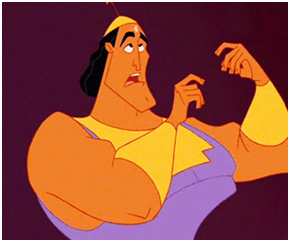
Warburton, Kronk’s voice actor, even described the character: “He’s about as sharp as a marble.” It makes for some outrageously funny exchanges between him and Yzma, where it’s like he’s always playing the stupid game . . . except he’s really just that ignorant. Kronk’s character would be sad, pitiable, and even a cruel joke by the writers except that he’s portrayed as being an accidental villain. In other words, he helps Yzma because she’s told him that’s his job, but left to his own devices, he would be happy to help someone else. There’s even a scene where a restaurant chef quits his job right in front of Kronk, and without missing a beat, Kronk begins filling orders, even using kitchen jargon! But if Kronk and even Yzma invite (some of) our sympathies, Kuzco does not.

He’s a spoiled brat in nearly every sense of the word. I don’t think we’re meant to hate him, but the first 30-40 minutes of this movie absolutely lead us to understand that, even though he suffers, being turned into a llama, he is not the good guy. It reminds me of something a professor once told me: “Not everything tragic is a tragedy.” In other words, Kuzco’s punishment strikes us as remarkably appropriate, especially since his selfish attitude endure long into the movie. Still, we like Kuzco, because he entertains us. His snappy, snarky comments keep the movie energized, and there’s even a great scene where the movie is “paused” so that he can step in and remind us that the film is really about “him.” Of course, that actually works as an counter-flag, underlining the real star of the show.
The Protagonist: Pacha, voiced by John Goodman
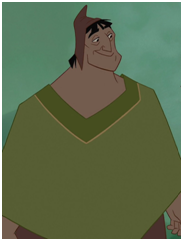
Pacha is introduced to us pretty early in the movie, so there’s not much of which he isn’t a part. And yet, it’s not like he went seeking glory, fame, or anything. Simply, a summons by the emperor brought him to the palace, where he learned that the emperor would destroy his home. Arriving back home, he discovers, through a weird trick of fate, that the emperor has been transformed into a llama, and placed at his mercy. Now, nobody can criticize Pacha for insisting that, before he promises to help the emperor, that Kuzco himself promise to not destroy his home. However, it’s what happens after this exchange, and how Pacha reacts to it that really makes him inspirational: Kuzco goes back on his promise, and yet Pacha still helps him.
Now, it would be easy to dismiss Pacha as a sucker, or maybe just ignorant for his blithe insistence on keeping his promise, but here’s the thing: for a selfish man like Kuzco, the only way to learn selflessness is by example . . . and in this case, Pacha has chosen to be that example.
We learned earlier in the movie, too, why Pacha may be willing to make this self-sacrifice. That is, he is a father, a family man, dedicated to his wife and children. Nobody in that same situation can doubt that a good father must self-sacrifice, and set a good example if he hopes for his children to improve their behavior. It’s obvious from his interactions with his family that they admire and love him. It’s a rare instance, maybe the only time where a Disney movie shows an intact nuclear family with healthy relationships all around:
My one, slightly less complimentary note on Pacha as that we don’t see, or even know what he does for work. I mean, I think we’re meant to assume that he’s a llama farmer, but it’s pretty unclear. We’re led to believe that he’s not afraid of working, but we never actually see him at his work. That’s frustrating, because for all the good he does in this movie, he’s not actually teaching his audience about fulfilling his vocation insofar as what he must do to support his family. I mean, it’s great that he can leave his work and his family in order to help the Emperor get back home, but most family men don’t have that luxury . . . not even close.
Still, the lessons that Pacha gives us are pretty much as 100% wholesome. I mean, I’m sure there’s a dictionary out there where, if you flip to the word “wholesome,” item number one reads “Pacha.” Sure he gets frustrated when the emperor treats him like dirt, but he’s pretty much the epitome of fatherly and friendly awesomeness, with a mountain of integrity to boot.
If my kids grow up to be like Pacha, I’m OK with that.
Honorable Mention: First Knight (1995)
Features Richard Gere, and Sean Connery.

This movie CANNOT make this list. The violence, and the inappropriate relationships (even if only insinuated) make this movie for 16+ at least.
Caution: spoilers ahead.
Also, the goodness of it comes in a can of corn, where the most admirable character (King Arthur, portrayed by Sean Connery) is framed as a great leader, but too boring to be truly inspirational. We’re instead supposed to like Sir Lancelot, portrayed by Richard Gere . . . who has no moral quibbles with pursuing a relationship with Queen Guinevere. Ick.
Still, there are vanishingly few movies with good medieval action scenes, and this one shows some dynamite swordplay well worth watching. Tomatoes rates the movie 43%, but 70% of the audience likes it.
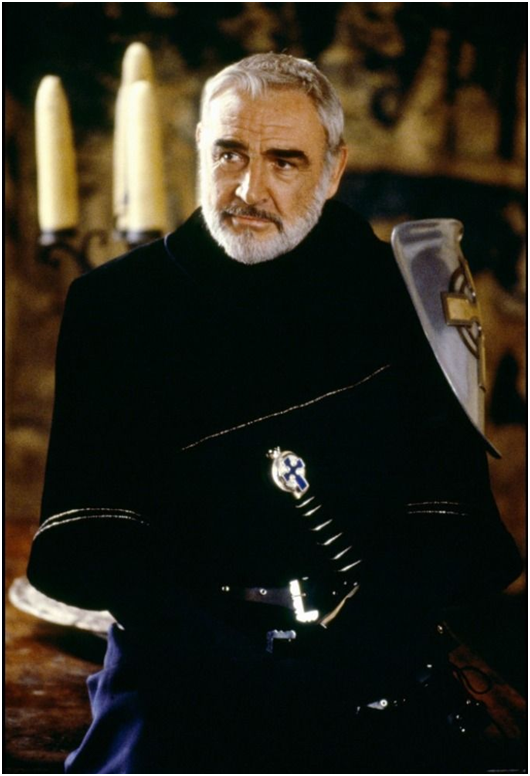
Also, there is nothing wrong with Connery’s King Arthur. There is even a scene where, when faced with a choice between death, and the good of his people, he chooses a noble, selfless death. When my sons are old enough to identify Lancelot’s flaws without being scandalized by the content of the movie, yes, I think I’m OK if my sons grow up to be like King Arthur.
Music I’m listening to: “The Mountain House,” by Jay Ungar and Molly Mason
Again- maybe you like it, maybe you don’t. Sometimes I just feel like sharing music, and this one is a particularly beautiful example of Appalachian style folk music. If you liked “Ashokan Farewell,” the song made famous by Ken Burns’ Civil War, I think you’ll like this one as well.
THANKS FOR READING!
Be kind: like and share please. 🙂
- (Edited by Tony Cole and Helen Krich Chinoy (1970), Actors on Acting: The Theories, Techniques, and Practices of the World’s Great Actors Told in Their Own Words, Crown Publisher’s, Inc. Pages 421-422.) ↩︎
